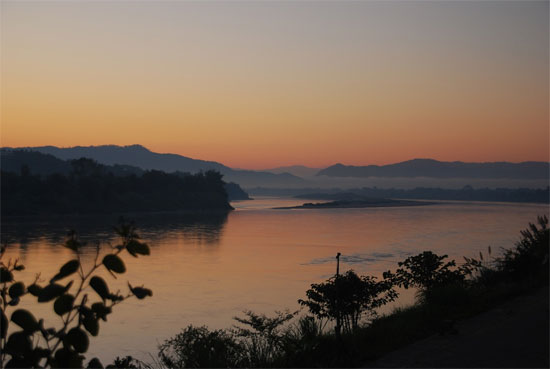Reduce the environmental impact of the Mekong River
Located downstream of the Mekong River, Vietnam is at risk of suffering tremendous impacts, unforeseen from programs and projects on the mainstream development upstream. Therefore, Vietnam needs solutions to cope with development scenarios in the Mekong basin.
Potential risks
In the downstream country, the territory of Vietnam lies in the Mekong River basin, accounting for about 8% of the basin area and about 11% of the total water volume. This territory includes the upstream of Nam Ron River, Dien Bien Province, upstream of Sekong and Se Ba Hieng Rivers, the Se San and Srepok River Basin and the Mekong Delta Region.
Vietnam has about 20 million people living in the Mekong Basin (17 million people in the Mekong Delta and 3 million in the Central Highlands), the majority of the population depends on agricultural and aquatic livelihoods. . Due to the close association between natural and socio-economic conditions of the sub-regions and the overall basin of the Mekong basin, upstream developments and flow changes will lead to more environmental impacts. school and society downstream.
According to the Environmental Assessment of the Mekong mainstream hydropower strategy, carried out by the International Center for Environmental Management (ICEM) for the Mekong River Commission, Vietnam has the greatest economic potential. due to potential impacts if the mainstream dam system is built.

Some of the predictable impacts that reduce the flow of the dry season, combined with the effects of climate change and sea level rise, will increase saline intrusion, affecting agriculture and aquaculture in Dong. in the Mekong River; the reduction of sediment load for the delta from 26 million tons / year to 7 million tons / year; Marine, freshwater and aquaculture products are all affected with an estimated loss of at least 500 million to 1 billion USD per year.
Response solution
On the basis of identifying the current situation and the current context, Ms. Tran Thi Thanh Thuy, Center for People and Nature (Non-governmental Organization works to protect the environment) believes that the response solutions of Vietnam can do this by maintaining and strengthening Mekong cooperation through the International Mekong River Commission. Until now, the best cooperation framework for exchanging, negotiating and seeking consensus on the issue of basin development is through the Agreement on the Sustainable Development Cooperation of the Mekong River Basin.
At the same time, the Center invests in strengthening organizational capacity for the Vietnam Mekong River Commission, with sufficient resources to implement programs and projects to study and monitor impacts, seeking solutions to attend timely advice to the Government in policy making and cooperation with countries in the basin.
Vietnam needs to create consensus in orienting the development model of the Mekong basin within the ASEAN community. Accordingly, it is necessary to aim at a development model to minimize emissions, reduce energy consumption, and wisely use natural resources. In addition, the participation of social organizations, non-governmental organizations should be encouraged in research, information dissemination, promoting cooperation and dialogue at the national and regional levels, in order to create support. social consensus in protecting the common interests of people in the basin in general and Vietnam in particular.
Especially, it is necessary to strengthen cooperation with the donor community and development partners like Laos and Cambodia to support your country in finding solutions for optimal and sustainable development, in accordance with the spirit of cooperation between countries in the basin. With the experience of economic growth and poverty reduction, Vietnam can help your countries to use international resources effectively, apply good models and avoid negative consequences that may stumble. in the development process.
The effective use of investment programs and projects and development assistance is also an important solution. As an investor, Vietnamese enterprises should learn and apply international standards in the process of implementing their project activities in their countries, in order to minimize the environmental-social consequences. Assembly The government should also have effective management tools, ensuring monitoring of investment flows, and mechanisms to encourage businesses to adopt good standards in foreign investment.
'Depending on each scenario, Vietnam has an appropriate response. But the most important thing is that there should be uniformity in development cooperation among countries to ensure that the lower Mekong basin is not threatened, " Thuy stressed.
- Continue postponing dam construction in Laos
- Lessons from Thailand for dams on the Mekong River
- New discovery of the process of forming the Mekong River
- It is proposed to postpone the construction of a dam on the Mekong River
- Smashing the Mekong River
- America participates in environmental protection downstream of the Mekong
- Experts call on Laos to abandon the hydroelectric dam
- Small dams threaten fish species on the Mekong River
- Thailand studies a flow of a tributary of the Mekong
- More than 87.3 million USD to overcome the disaster of Mekong River
- Environmental protection of surface water in the Mekong Delta
- 'Should postpone dam construction on the Mekong for 10 years'
 Is the magnetic North Pole shift dangerous to humanity?
Is the magnetic North Pole shift dangerous to humanity? Washington legalizes the recycling of human bodies into fertilizer
Washington legalizes the recycling of human bodies into fertilizer Lightning stone - the mysterious guest
Lightning stone - the mysterious guest Stunned by the mysterious sunset, strange appearance
Stunned by the mysterious sunset, strange appearance